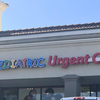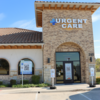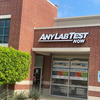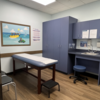
Childhood Obesity: Symptoms, Causes and a Parental Guide
Childhood obesity is a pressing public health issue that is on the rise globally. According to the World...
Read moreHelp patients book appointments with you on Solv. It's free!
20 instant-book locations




















Help patients book appointments with you on Solv. It's free!
An antibody test, also known as a serology test, can detect antibodies in your blood. Your body develops antibodies in response to infections like COVID-19 or after receiving vaccinations.
ACCORDING TO THE FDA, the COVID-19 antibody test is formally known as the SARS-CoV-2 antibody test. SARS-CoV-2 is the virus that causes COVID-19. This antibody test can tell whether you have SARS-CoV-2 antibodies in your blood. If you do, you have either been infected with COVID-19 or have recovered from it, adds the FDA.
According to the CDC, the COVID antibody test can help you determine how well your immune system defends itself against the virus. It adds that this test can also help you understand population-level protection.
The main reason antibody testing is done, according to the CDC, is to determine whether you have COVID-19 antibodies in your blood and have had a past infection. However, the CDC says this test should not be used in place of viral COVID testing to determine if you have a current infection or if you have immunity to SARS-CoV-2 after getting the COVID vaccine.
COVID-19 can be diagnosed using a viral test. In addition, the CDC reports that a viral test can determine whether you are currently infected with SARS-CoV-2.
During the viral test, a healthcare worker will take a sample from either your nose or mouth. Your sample is then analyzed using a polymerase chain reaction (PCR) test or antigen test.
A PCR test works by finding the DNA or RNA of a pathogen or abnormal cells in a sample, reports the National Institutes of Health (NIH). Most viruses, including COVID-19, contain DNA or RNA, adds the NIH.
The CDC notes that a PCR test can detect COVID in its earliest stages. Results from these lab tests usually come back within several days, says the CDC.
An antigen test works by finding SARS-CoV-2 molecules on the virus surface, reports the Massachusetts Institute of Technology. These rapid tests return results within a few minutes, and can be performed by a healthcare worker or yourself at home, reports the CDC. Solv features a directory that can help you find nearby COVID testing.
PCR and antigen tests can tell you whether you are currently infected with COVID-19, notes the CDC. However, the antibody test can tell you only if you have had a previous infection. An antibody test cannot tell you if you currently have COVID-19, says the CDC.
Positive results from a COVID antibody test indicate that you had a previous SARS-CoV-2 infection or COVID-19, reports the FDA.
Negative results from a COVID antibody test indicate that antibodies to COVID were not detected in your blood. The FDA adds that a negative result could mean it’s possible you had a previous SARS-CoV-2 infection, but your body did not make antibodies yet, or that the level of antibodies made by your body is too low to be measured by the test.
Antibody tests can also be used to look for antibodies of other diseases, reports the NIH. These diseases include measles, mumps, hepatitis, mononucleosis, and varicella-zoster virus.
Your doctor may suggest getting antibody tests for these diseases to determine whether you are up to date on vaccinations and need boosters or to diagnose an autoimmune disease like lupus. Antibody tests are also sometimes performed as a requirement for your school or job, adds the NIH.
The COVID-19 antibody test is available at urgent care centers, walk-in clinics, pharmacies, lab test providers, and hospitals, says the CDC. Contact your healthcare provider directly to find out if it offers the COVID antibody test, or use Solv to find a testing provider in your area. Solv also allows you to make a same- or next-day appointment.
COVID-19 antibody tests can tell you if you have had a previous COVID-19 infection, says the FDA. In comparison, a diagnostic COVID test can tell you if you are currently infected by COVID-19. If your goal is to find out whether you currently have COVID-19, ask your healthcare provider about your options for diagnostic tests, or use Solv to find a nearby COVID-19 testing provider.
According to New York City Health, the COVID-19 antibody test requires giving a blood sample. During the test, your healthcare provider will take a sample of your blood with a quick finger prick or by drawing blood from a vein in your arm. The NIH adds that this test usually only takes about five minutes. Your healthcare provider will contact you to discuss your results after they return.
According to the FDA, the COVID antibody test could produce a false negative, which occurs when the test fails to detect antibodies for SARS-CoV-2 even though you have them. It adds that your test result may also come back negative if you received the COVID-19 vaccine, but your body produced different antibody types in response to the vaccine. Your doctor can discuss other limitations of COVID antibody tests with you in more detail during your appointment.
No, a semi-quantitative COVID-19 antibody test cannot determine your level of immunity to COVID-19, even if you have been vaccinated for this disease, reports the FDA. It adds that even though a positive antibody test can indicate that an immune response has occurred, more research is needed.
No, the semi-quantitative COVID-19 antibody test cannot track your antibody levels over time, says the FDA. This test cannot evaluate your level of immunity or protection from COVID-19, even if you have received a vaccination against COVID-19. The FDA adds that if antibody test results are interpreted incorrectly, people may take fewer precautions against this disease.
The cost of the COVID antibody test depends on factors such as rates set by the provider and whether your health insurance covers some or all testing costs. According to the University of Rochester, many health insurers are not covering the cost of the COVID antibody test unless it is considered medically appropriate for diagnosis and treatment purposes. Check with your healthcare provider to confirm the cost of the COVID antibody test.
According to the CDC, the COVID antibody test may be ideal for you if you want to know if you have previously been exposed to COVID-19, or if you want to know if you have antibodies if you already had this disease. The COVID antibody test cannot tell you if you currently have COVID-19.
The COVID antibody test is available from many pharmacies, labs, and healthcare providers. To find a testing provider, use Solv’s directory to find the highest-rated COVID antibody testing providers in your area.

Updated on Dec 25, 2024
Solv has strict sourcing guidelines and relies on peer-reviewed studies, academic research institutions, and medical associations. We avoid using tertiary references.
Chickenpox Vaccine in Fort Worth
DOT Exam in Fort Worth
Ear Wax Removal in Fort Worth
Flu Shot in Fort Worth
Hepatitis Vaccine in Fort Worth
Measles Vaccine (MMR) in Fort Worth
Physical Exam in Fort Worth
Shingles Vaccine in Fort Worth
Sports Physicals in Fort Worth
Tetanus Shot in Fort Worth
Typhoid Vaccine in Fort Worth
Yellow Fever Vaccine in Fort Worth
A1C Test in Fort Worth
Allergy Testing in Fort Worth
Basic Metabolic Panel in Fort Worth
CMP Test in Fort Worth
COVID-19 Antibody Test in Fort Worth
Diabetes Test in Fort Worth
Diagnostic Test in Fort Worth
Flu Test in Fort Worth
H Pylori Test in Fort Worth
Hepatitis test in Fort Worth
Mono Test in Fort Worth
Pregnancy Test in Fort Worth
RSV Test in Fort Worth
STD Testing in Fort Worth
Strep Test in Fort Worth
TB Test in Fort Worth
Thyroid Test in Fort Worth
Vitamin D Test in Fort Worth
Tips, advice, news—your resource to stay healthy and safe while improving your experience with healthcare providers when you need them.